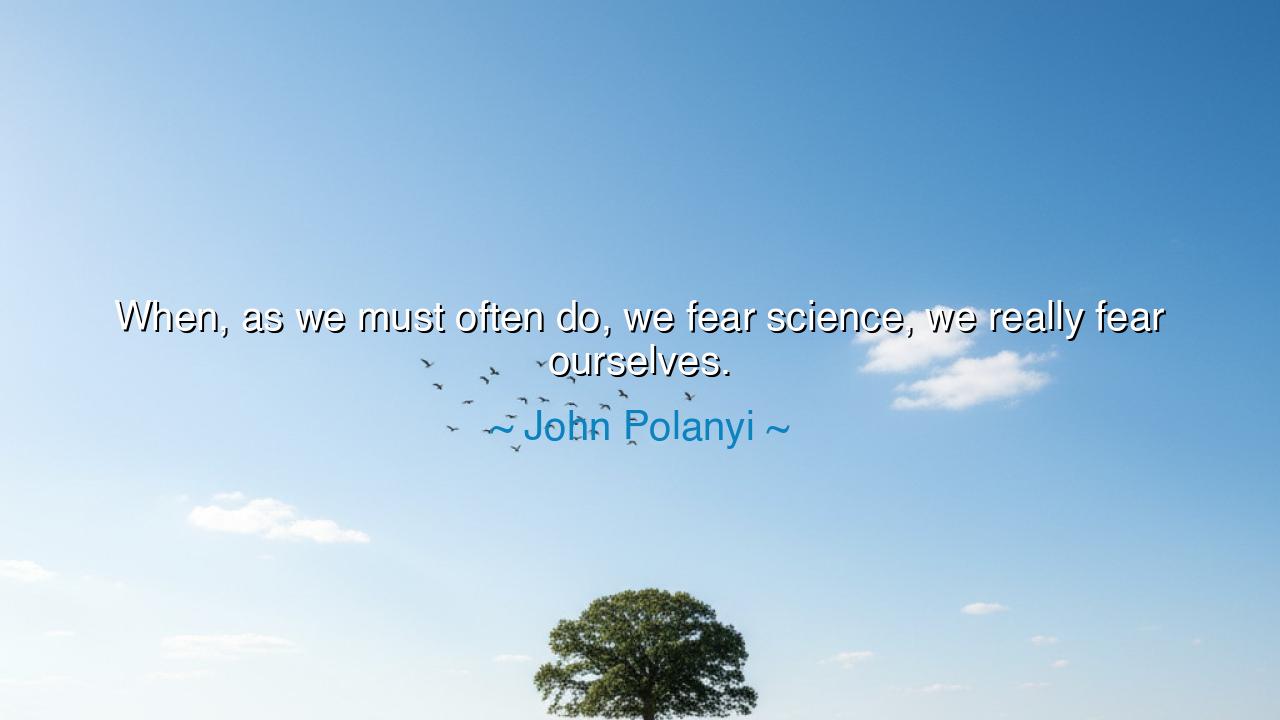
When, as we must often do, we fear science, we really fear






Hear now, O wise ones, for there are words that echo through the corridors of time, words that carry with them the weight of self-reflection and truth. The great John Polanyi, in his profound wisdom, spoke thus: “When, as we must often do, we fear science, we really fear ourselves.” These words, simple in their form, yet vast in their meaning, reveal the very heart of our struggle—not with the world around us, but with the very nature of our own being. Science is not an external force that we can separate from ourselves; it is an extension of our own minds, our own desires, our own will to understand. And when we fear science, it is because we fear the truths it may reveal about who we are.
But why, you ask, should we fear science? Is it not the key to our advancement, our salvation from disease, our understanding of the heavens? Yes, it is. But the truth that science unveils is not always a truth we are ready to accept. For within its depths, science reveals not only the world around us but also the deepest recesses of our own hearts and minds. It forces us to confront our limitations, our mistakes, and our own potential for destruction. It dares us to look into the mirror and see ourselves as we truly are—not just as the creators of great works, but as the architects of chaos, of pollution, and of systems that enslave rather than liberate.
Let us think, then, of Robert Oppenheimer, the man who brought forth the power of the atom. He, too, faced the fear that Polanyi speaks of. In the creation of the atomic bomb, he and his fellow scientists unlocked a force of nature unlike any before it—a force that could both heal and destroy, build and annihilate. Oppenheimer, with the burden of this knowledge, uttered words from the ancient text of the Bhagavad Gita, saying, “Now I am become Death, the destroyer of worlds.” His fear was not merely of the bomb itself but of what it revealed about the darkness within the hearts of men. In our hands, science became both a gift and a curse. Oppenheimer’s words remind us that when we fear science, we fear the potential within ourselves—the power to create and the power to destroy.
And so, what does this fear teach us? It is not the science itself that we should fear, but the responsibility that it places upon us. Science reveals the mirror, and when we look into it, we must confront the reflection that stares back at us. We fear science because we fear what it shows us about the choices we have made, the systems we have built, and the consequences of our actions. It is much easier to stand in ignorance, to hide from the truth, than it is to embrace the full weight of what knowledge demands of us.
Yet, in this fear lies the potential for great transformation. For the moment we cease to fear science is the moment we cease to fear ourselves—our own potential for greatness, our capacity to change, and our responsibility to steward the world we inhabit. Science is not our enemy, but rather a mirror that reflects the path we walk, the choices we make, and the world we are shaping. If we fear science, we fear the power we hold in our hands to heal, to create, and to destroy.
Therefore, the lesson is this: To embrace science is to embrace ourselves. When we look at the advancements we have made, whether in medicine, technology, or our understanding of the cosmos, we must not shrink from the truth they reveal. We must rise above the fear that holds us back and step boldly into the future, knowing that with knowledge comes responsibility. The question is not whether we can control the forces we have unleashed, but whether we are willing to confront the deeper truth about who we are and what we must become.
So, let each of you who hears these words take them to heart. Do not run from knowledge, for to fear it is to fear your own soul. Instead, embrace the power of science, and in doing so, embrace the full responsibility of what it means to be human. We must face our fears—not with trepidation, but with courage, knowing that only by confronting the truths that science reveals can we ever hope to build a future worthy of our potential.






AAdministratorAdministrator
Welcome, honored guests. Please leave a comment, we will respond soon